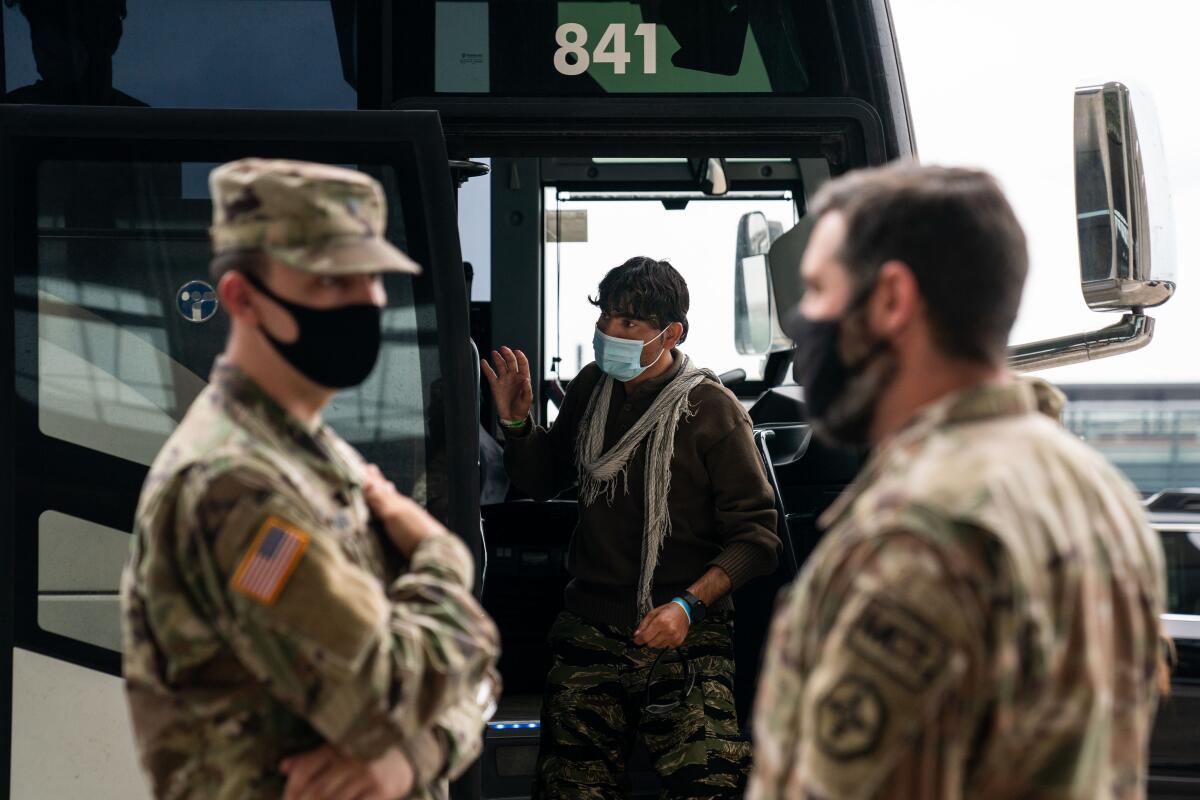The end of America’s longest war — and our duty to the Afghan people

- Share via
“The war in Afghanistan is now over.”
With these simple but heavy words, President Biden drew a line Tuesday under America’s longest war. It was a 20-year conflict that stretched across four presidencies, took the lives of 2,400 U.S. service members and at least 71,000 Afghan civilians, and cost our nation more than $2.3 trillion.
The rapid, chaotic fall of Afghanistan to the Taliban, the terrorist group that brutally dominated the country from 1996 until a U.S.-led invasion in 2001, is a tragedy not only for 38 million Afghans but for an international community that tried over 20 years to remake the landlocked Central Asian country into a flourishing democracy that respects human rights and women’s rights.
The cold, sad truth, as Biden said Tuesday, is that the United States had only one real aim in invading Afghanistan following the Sept. 11, 2001, attacks on the World Trade Center and the Pentagon. “What is the vital national interest?” he asked. “In my view, we only have one: to make sure that Afghanistan can never be used again to launch an attack on our homeland.”
This editorial board has supported Biden’s decision to withdraw from Afghanistan — a decision that has come under attack from conservatives, fearful that the U.S. has lost strength and credibility, and from liberals, fearful that the resumption of an austere, fundamentalist theocracy will spell the loss of hope and opportunity for Afghanistan’s young population, and especially women and girls. The U.S. was legally obliged to withdraw under the February 2020 deal between the Trump administration and the Taliban. Moreover, an earlier evacuation would have only accelerated the collapse of the Afghan government. War, sadly, is messy.
We agree with the difficult, essential decision to end this war. The truth is, 20 years of ruinous conflict in Afghanistan and Iraq have left America weaker, not stronger. Terrorism and extremism, both foreign and domestic, remain major threats to our national security, but far greater threats loom over the long term: China’s challenge to American economic and military dominance, the unpredictable impacts of a warming atmosphere and pandemics like COVID-19 that have shut down much of the world for a year and a half. Biden was correct to say there was no longer a reason to stay in Afghanistan after Al Qaeda’s leader, Osama bin Laden, was killed May 2, 2011, in Pakistan.
Are we fearful of another catastrophic terrorist attack — like the suicide bombing that ISIS-K, an Islamic State affiliate in Afghanistan, launched last week outside the Kabul airport? Of course. But we agree with what Biden said Tuesday: “The best path to guard our safety and our security lies in a tough, unforgiving, targeted, precise strategy that goes after terror where it is today, not where it was two decades ago.”
The more credible criticism, to us, concerns the fate of the Afghan people themselves.
Over the past several weeks, some 100,000 Afghan contractors, interpreters, translators and administrative personnel who helped our military, our diplomats, our aid workers, our charities and our media organizations over the past 20 years have been airlifted to safety, along with 5,500 American citizens.
Tragically, many more — at least tens of thousands more — are still stuck in Afghanistan, fearful that the schools, freedoms, opportunities and safety will suddenly vanish.
While the images of Afghans running alongside military planes — and in at least two cases, falling from a military plane as it took off — horrify and shock us, we must remember that countless other Afghans are not from Kabul and, as the Taliban quickly seized city after city, had no opportunity to make it to the capital, much less the airport.
Just as they took in hundreds of thousands of refugees from Vietnam, Cambodia and Laos after the Vietnam War, the U.S. and its allies must open their arms to the courageous women and men who helped, along with their families. There is a humanitarian case to embrace those fleeing their homelands, and there is a strategic rationale too. We have a moral obligation to help those who helped us, but there is also the reality that the Afghan refugees will make America’s communities stronger: opening businesses, earning degrees, teaching children, supporting the elderly. Immigrants have always given expression to America’s highest ideals, and Afghan refugees must be given the opportunity to do so.
It will take time for America, and the world, to process the trauma of the past several months. The U.S. is out of Afghanistan, but it cannot leave behind the people of Afghanistan. As Biden said Tuesday, we must support Afghans through diplomacy, international influence and humanitarian aid. We must work with regional powers — even countries like Iran and Russia that have tense relationships with the U.S. — to ensure that Afghanistan does not once again become a hub for terrorism and lawlessness.
America must continue to pursue human rights — through multilateral institutions and through the power of our example, not through endless military deployments.
More to Read
A cure for the common opinion
Get thought-provoking perspectives with our weekly newsletter.
You may occasionally receive promotional content from the Los Angeles Times.









